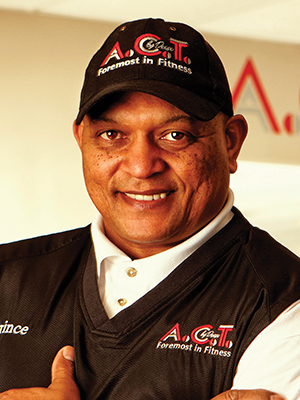 Prince Deese
Prince DeesePrince Deese, an All American Wrestler, a Hall of Fame Football Player, and a State Champion Body Builder, is a certified personal trainer and strength conditioning specialist. Prince Deese and Gina Deese own A.C.T. by Deese, a Fitness & Training Center in Greensboro, NC. Contact him at 336-617-5304.
High blood pressure is a common occurrence in people. Lack of regular exercise is a major contributor to the development of hypertension, which can lead to severe complications if left unaddressed.
When your blood pressure is high, it can negatively impact your organ health. It is normal for your blood pressure to increase when you’re exercising, and your heart is pumping blood faster through the body. However, your resting blood pressure should be lower than 120 mm Hg for the systolic phase of your heartbeat and below 80 mm Hg for the diastolic phase.
The Link Between Weight Gain and Hypertension
Most people notice an increase in hypertension with weight gain. This is because the heart needs to work harder to pump blood throughout your body, putting it under constant and unnecessary strain.
Over the years, this can lead to heart and health problems. However, you can reduce your blood pressure by losing weight, which is possible through regular exercise.
If you can drop even a few pounds of body fat, you can improve your symptoms of hypertension. Combining regular exercise with the reduction of daily calories plays a significant part in managing high blood pressure. So, if you’re overweight and have high blood pressure, the fastest way to improve your condition is to lose weight.
How Exercise Reduces High Blood Pressure
If you’re not used to exercise, you can start your fitness journey by walking every day for thirty to sixty minutes. This is quite manageable for most people, and walking does not strain the heart, making it a sustainable form of exercise.
Once you are used to being more active, you can increase the intensity by adding jogging, cycling, sprinting, or weightlifting to the equation. These forms of exercise not only help you lose weight but also improve your cardiovascular system, which is known to increase your lifespan.
One of the fastest ways to accelerate weight loss and boost your stamina is by practicing high-intensity interval training. This might involve sprinting for 100 meters, followed by an active resting period of three to five minutes. So, you’re essentially sprinting, walking for recovery, and repeating this process five to eight times.
Adding this to your workout schedule only twice a week can help dramatically reduce the effects of hypertension. However, you should only attempt this once you are used to regular exercise since it forces you to push your heart to at least 90% of its max capacity.
It goes without saying that aged people should not attempt this unless they are very fit and used to exercise. Even then, they should not push their heart to max capacity and stick to moderate forms of exercise like jogging.
Once you start losing weight and reach about 15% body fat, which is normal for the average person, your blood pressure will decrease. Generally, the leaner you are, the lower your blood pressure because your heart does not have to work as hard to circulate blood.
The Role of Nutrition and Diet in Managing Hypertension
You might have heard the saying “you are what you eat.” Processed foods and fast food are one of the first things you need to cut out when taking your fitness seriously to reduce your blood pressure.
Most people do not read nutrition labels, so are unaware of the calories they are consuming on a daily basis and what ratio of macronutrients constitutes those calories.
Micronutrients, such as vitamins and minerals, play a massive role in improving your general health. When dealing with hypertension, it is best to eat a healthy balance of foods while minimizing sodium and processed foods.
There is no “one” specific diet that can cure you of all your ailments. Generally, it is best to keep your calorie consumption close to your maintenance calories and eat foods rich in micronutrients.
Vitamin and mineral deficiencies can lead to aggravated symptoms of hypertension. It is best to get your vitamins and minerals from fruits, vegetables, and whole foods.
Is Weight Training Good for High Blood Pressure?
Not everyone enjoys doing cardio. Some people find that walking is the only form of cardio they can sustain. In such cases, it is worth joining the gym and taking up weight training as a hobby.
Lifting weights can become an enjoyable process once you start applying progressive overload and notice yourself getting stronger. Muscle is more metabolic than fat, meaning more of it is beneficial for your overall health. One pound of muscle burns at least forty calories at rest, meaning your body will burn fat more efficiently if you have more muscle.
Final Verdict
Hypertension can lead to serious health complications. Therefore, it is advised to focus on losing weight, exercising regularly, and eating better foods throughout the day. Sometimes it is necessary to take medication, especially if you are struggling to control your symptoms of ill health.
However, the best remedy is to focus on the natural before considering medication. If you can bring your hypertension under control through exercise and nutrition, that should be your number one priority.

